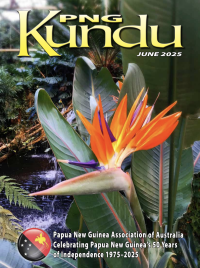54. Bukumbangi, a policeman with initiative
Paul Quinlivan’s Snapshots
We have already asked who trained Bunat, Paheki, Muyei and others; who allowed Sauweni and others to flourish and, since it appears that – with some notable exceptions – modern-day Papua New Guineans do not automatically display the same initiative, I feel that I should point out that these were far from unique. Peter Ryan’s description of Lance Corporal Kari in his Fear Drive My Feet (Melbourne Uni. Press, 1959) is well known but I would like to pay tribute to a forgotten group who are represented by this illiterate Chimbu. Although I was recruited to be a Crown Prosecutor, I also defended people. And one of these arose out of a tribal war (reported in the South Pacific Post of 11 and 25 July 1952) in which Goilala labourers at Koitaki Plantation, in the mountains behind Port Moresby, killed a Chimbu labourer. I cannot find a note of the date of the trial, or my clients’ names, and I have absolutely no memory of the case itself: it was just like any other battle between two ‘lines’. The aftermath of it, however, is as clear as if it happened yesterday. I got both my clients off but, that evening, when I returned to the LOQ (the Legal Officers Quarters in a big empty block in Hunter Street with wonderful views but completely open to any passer-by) a delegation of three Papua New Guineans awaited me. I said ‘Good-day’ and the burliest replied in a burst of pidgin and the tall, elegant one beside him said, ‘I have been asked to interpret. This man is Bukumbangi, the Captain of the Chimbus and he wants to talk to you about the court case you had today.’
I said, ‘I have never heard of a Captain of Chimbus. What is that?’ and the elegant one said, ‘Where there are a large number of Sepiks or Chimbus or other people in any town there is always a policeman who has the duty to make sure that they all “sit down good together”. I am a policeman and Captain of my group in Moresby and Bukumbangi, who is a policeman and a Chimbu, is responsible for the good conduct of the Chimbus here. And he is worried that, if he and you cannot agree to a certain course of conduct, the Chimbus will get out of hand and, if they do, they could kill you and this would bring great shame to him.’ I said ‘Oh’.
Bukumbangi then spoke and the translation was, ‘He says that you will be all right at night, because his people will have to have a “pass”. And he doesn’t have to worry about when you are at your office or in the court. It is when the curfew is lifted and you are at home, or when you go walking, that he has to worry about what his people might do so he has devised a plan to which you must agree.’
‘Must agree’ was precisely what he meant but there was no arrogance in it. Certainly no blackmail! It was a simple statement of what Bukumbangi had decided should be done and my only function was to pay a reasonable sum, each week, for his (Bukumbangi’s) brother, Mondo, to be my guardian during the designated hours. I must admit that I had had some flutters of apprehension – there had, after all, been a lot of Chimbus put in hospital and at least one killed. To cut a long story short, he convinced me of the reasonableness of what he was proposing and, with the approval of Andy O’Driscoll and Joe Lynch, with whom I shared the donga, Mondo became a fixture around the LOQ when I was there and, less obvious – but close by – when I was away from the house. Then, after three weeks of my paying a very small sum, Bukumbangi came and told me that he had convinced the Chimbus that I should not be touched, and the arrangement ceased. I kept Mondo on, on an irregular basis, to water the hedge he had grown to shield the LOQ from public view and to do other odd jobs including the repair of broken floorboards in the donga.
A year later Bukumbangi was at the LOQ again and said I was going to Sogeri for the inaugural Sogeri Show (6 September 1953) and he could not be sure that the Chimbu labourers at the various plantations in that area might not get out of control. I told him that I was not going to Sogeri but, three days later, Bruce Ireland invited me to go and Bukumbangi was on my doorstep next day to say ‘I told you so!’ and promising to be close at hand if I needed protection! And I did catch a glimpse of him up there.
When Sir Alan Mann arrived and was looking for a domestic servant I told him this story and he asked if I could find Bukumbangi. I did, and Mondo became his first servant and remained with him for some years. I have asked a number of Old Timers whether this Captain system was a hang-over from German days or whether some kiap created it but although many knew of it, in certain towns, nobody has been able to tell me. But whoever kept it going did a wonderful job. My mind boggles at the thought of anyone, particularly a lowly-paid constable of police, accepting responsibility for the conduct of all the Chimbus that the various plantations saw fit to bring in. But, to Bukumbangi, it was a matter of ‘shame’ if he did not do the job well and, as C.J. Dennis and the Australians of his era used to say, ‘I dips me lid!’




